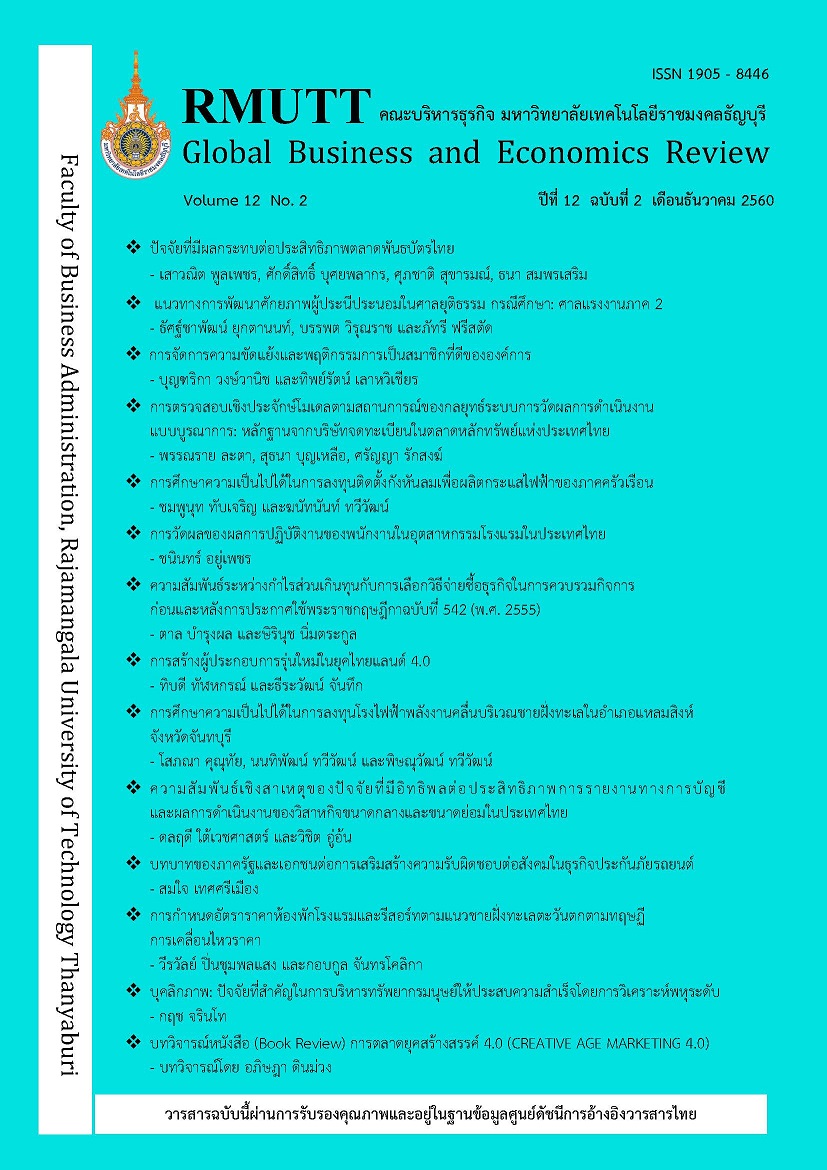THE ROLE OF PUBLIC AND PRIVATE SECTORS IN SOCIAL RESPONSIBILITY IN THE CAR INSURANCE INDUSTRY
Keywords:
Public and Private Sector, Corporate Social Responsibility, Auto Insurance BusinessAbstract
The study of public and private roles in social responsibility in the automobile insurance industry. The purpose to study the role of public and private sectors and the success factors in social responsibility and the automobile insurance business in Bangkok and its vicinities. The data were collected from interviews with is reasons involved in the public and private sects in social responsibility in the car insurance industry. The study found that the role of public and private public and private sects in social responsibility in the car insurance industry can be achieved in three ways: 1. corporate social responsibility in process or production and internal services 2. volunteer activities and 3. corporate social responsibility of the agency is set up as a foundation, funding supporter for non-profit public benefit organizations. In another hand, the factors affecting success of public and private sector in social responsibility insurance industry in Bangkok and its vicinities are transaction in the car leadership , corporate governance and government policies and push from the government And the problem is (1) most car insurance business executives lack knowledge and understanding about business operations (2) the car insurance business is uncertain whether CSR or CRS is cost effective and not sure if it will return to the CSR business and (3) insufficient resources to support social responsibility or CSR.
References
ตลาดหลักทรัพย์แห่งประเทศไทย. (2555). แนวทางความรับผิดชอบต่อสังคม. กรุงเทพฯ: เมจิกเพรส.
พงศ์ศรันย์ พลศรีเลิศ. (2555). งานวิจัยที่เกี่ยวกับ CSR และการตลาดเพื่อสังคมในไทย. สืบค้นจาก https://phongzahrun.wordpress.com/2012/01/06
วีรวัฒน์ ปันนิตามัย. (2556). การศึกษาแนวปฏิบัติการบริหารความรับผิดชอบต่อสังคมของหน่วยงานภาครัฐของไทย. สืบค้นจาก http://rc.nida.ac.th/th/attachments/article/2/e-pro-nida2013_1.pdf
สุทธิศักดิ์ ไกรสรสุธาสินี. (2550). CSR มิติใหม่ในการบริหารธุรกิจ. วารสารสื่อพลัง, 15(1).
สุพานี สฤษฎ์วานิช. (2552). พฤติกรรมองค์การสมัยใหม่:แนวคิดและทฤษฎี. กรุงเทพฯ: โรงพิมพ์ มหาวิทยาลัยธรรมศาสตร์.
สุภางค์ จันทวานิช. (2553). วิธีการวิจัยเชิงคุณภาพ พิมพ์ครั้งที่ 18. กรุงเทพฯ: จุฬาลงกรณ์มหาวิทยาลัย.
Albereda, L., Lozano, J. M., & Ysa, T. (2007). Public policies on corporate social responsibility: the role of governments in europe. Journal of Business Ethics, 74(4), 91-107.
Anand, S. (2008) .Essentials of corporate governance. New Jersey: John Wiley & Sons.
Angus-Leppan, T., Metcalf, L., & Benn, S. (2010). Leadership styles and CSR practice: an examination of sensemaking, institutional drivers and CSR leadership. Journal of Business Ethics, 93(2), 189-213.
Bass, B. M. (1985). Leadership and performance beyond expectations. New York, NY: Free Press.
Bass, B. M. & Avolio, B. J. (1994). Improving organizational effectiveness through transformational leadership. C.A: Sage Publications.
Fox, T., Word, H., & Howard, B. (2002). Public sector roles in strengthening corporate social responsibility: a base study. Washington D.C.: The World Bank.
Organisation for Economic Co-operation and Development (OECD). (2004). Principles of corporate governance. Paris: OECD.
Ripley, R., & Franklin, G. (1982). The bureaucracy and public policy. Homewood, Ill.: Dorsey Press.
Downloads
Published
How to Cite
Issue
Section
License
The articles published in this journal are the intellectual property of their respective authors.
The views and opinions expressed in each article are solely those of the individual authors and do not reflect the positions of Rajamangala University of Technology Thanyaburi or any of its faculty members. All components and content of each article are the sole responsibility of the respective authors. In the event of any errors, the authors shall bear full responsibility for their own work.








